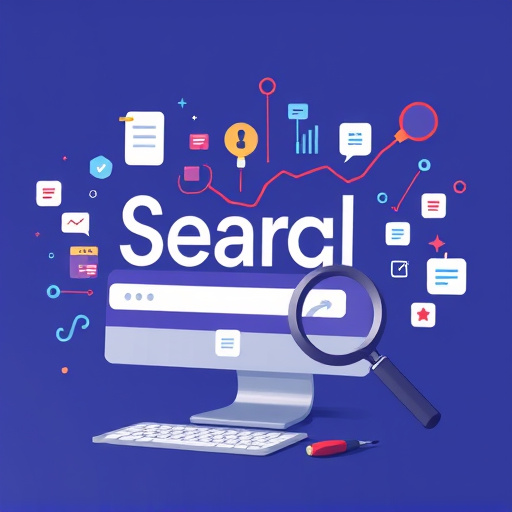Enterprise SEO Solutions: Optimizing Site Architecture for Success

Enterprise SEO solutions require a multi-faceted approach: content optimization tailored to user nee…….
Welcome to an extensive exploration of a topic that has become pivotal in the digital age—Enterprise SEO (Search Engine Optimization) Solutions. In today’s highly competitive online marketplace, businesses are increasingly recognizing the power of search engines as gateways to success. This article aims to provide an all-encompassing guide, delving into various facets of enterprise SEO solutions and how they shape the digital landscape. By the end, readers will grasp their significance, applications, and the impact on global markets.
Definition: Enterprise SEO solutions refer to a comprehensive set of strategies, techniques, and technologies employed to enhance the online visibility and search rankings of large-scale businesses or enterprises across various search engines like Google, Bing, and Yahoo. It involves optimizing websites, content, and digital assets to ensure they align with search engine algorithms, thereby driving organic (non-paid) traffic.
Core Components:
Keyword Research and Analysis: Identifying relevant keywords that potential customers are searching for is the foundation of enterprise SEO. Tools like Google Keyword Planner, SEMrush, or Ahrefs assist in uncovering high-volume, low-competition keywords.
On-Page Optimization: This involves optimizing individual web pages to include targeted keywords naturally within content, meta titles, descriptions, header tags (H1, H2, etc.), and image alt text.
Technical SEO: Ensuring a website is crawlable and indexable by search engines is crucial. Technical SEO includes fixing site speed issues, implementing structured data markup, improving XML sitemaps, and ensuring mobile-friendliness.
Content Creation and Optimization: Developing high-quality, relevant content that satisfies user intent is essential. This involves blog posts, articles, infographics, videos, and more, all optimized for target keywords.
Link Building: Acquiring backlinks from authoritative websites is a powerful signal to search engines. Enterprise SEO strategies focus on earning links through quality content, guest blogging, influencer partnerships, and broken link building.
Historical Context: The concept of SEO has evolved significantly since its early days in the late 1990s. Initially, keyword stuffing was prevalent, but search engines adapted with algorithms like Google’s PageRank. Over time, SEO became more sophisticated, focusing on user experience, content quality, and authoritative sources. Today, enterprise-level SEO requires a strategic approach, combining technical expertise with a deep understanding of business objectives.
The impact of enterprise SEO solutions is not limited to any single region; it has become a global phenomenon. With the internet’s reach extending worldwide, businesses must adapt their strategies to cater to international audiences. Here’s how enterprise SEO shapes the digital landscape globally:
International Market Access: SEO enables businesses to penetrate new markets without significant physical expansion. By optimizing websites for local keywords and languages, companies can attract relevant traffic from specific regions.
Cultural Adaptation: Different cultures have varying search behaviors and preferences. Enterprise SEO solutions must consider these nuances, ensuring content is localized and culturally relevant to resonate with diverse audiences.
Global Trends: Key trends in enterprise SEO include the rise of voice search, enhanced focus on user experience (UX), mobile optimization, and the increasing importance of local SEO for global businesses. For instance, Google’s BERT algorithm improved semantic search capabilities worldwide.
Regional Differences: Search engine usage varies across regions. In Asia, for example, Baidu dominates in China, while Google is prevalent in most other parts of the world. Enterprise SEO strategies must be tailored to these differences, employing region-specific keywords and content.
Enterprise SEO solutions play a pivotal role in shaping economic systems and business strategies worldwide.
Market Dynamics:
Increased Online Competition: As more businesses go digital, the online market becomes highly competitive. Enterprise SEO helps companies stay relevant and visible amidst this competition.
Cost-Effectiveness: Unlike paid advertising, SEO offers long-term benefits with continuous returns on investment (ROI). Once established, top search rankings can drive consistent organic traffic.
Investment Patterns:
Budget Allocation: Businesses are allocating significant portions of their digital marketing budgets to SEO, recognizing its potential for sustainable growth. This shift is evident in the increasing demand for in-house SEO teams or external specialized agencies.
ROI Measurement: Advanced analytics tools enable businesses to track and measure SEO’s impact on sales, conversions, and overall revenue. This data-driven approach ensures strategic decision-making.
The Role in Economic Systems:
Digital Transformation: Enterprise SEO is a driver of digital transformation, encouraging businesses to adapt their operations and customer engagement strategies for the online realm.
Job Creation: The growing demand for SEO professionals has led to job creation across various sectors, from content writing to data analysis.
Technological innovations have significantly contributed to the evolution of enterprise SEO solutions, opening up new possibilities and challenges.
Artificial Intelligence (AI) and Machine Learning:
Natural Language Processing (NLP): AI-powered NLP enables search engines to understand user queries better, leading to more accurate search results and improved content relevance.
Personalized Search: Machine learning algorithms can tailor search engine results to individual users based on their preferences, location, and browsing history. This personalized approach influences SEO strategies to cater to diverse user needs.
Voice Search Technology:
Rise of Voice Assistants: With the popularity of voice assistants like Siri, Alexa, and Google Assistant, voice search has gained traction. Enterprise SEO now focuses on optimizing content for spoken queries.
Long-Tail Keywords: Voice search often involves longer, more conversational keywords (long-tail keywords). Optimizing for these can increase visibility during voice searches.
Big Data Analytics:
Competitor Analysis: Big data analytics tools allow businesses to analyze competitors’ SEO strategies, identify gaps, and make informed decisions.
Predictive Analytics: By studying trends and patterns, enterprise SEO teams can predict search engine algorithm updates and adjust strategies accordingly.
The digital world is not immune to legal considerations, and enterprise SEO solutions must adhere to various policies and regulations worldwide.
Privacy Laws:
GDPR (General Data Protection Regulation): In Europe, GDPR sets standards for data protection and privacy, influencing how businesses collect and use user data for SEO activities.
CCPA (California Consumer Privacy Act): The CCPA provides California residents with increased control over their personal information. Businesses must ensure compliance to avoid legal repercussions.
Copyright and Content Issues:
Plagiarism and Copyright Infringement: Enterprise SEO involves content creation and optimization. Businesses must respect copyright laws and avoid plagiarism to stay within legal boundaries.
Disclaimers and Legal Pages: Some jurisdictions require websites to have disclaimers, terms of service, and privacy policies, which impact SEO strategy implementation.
Search Engine Guidelines:
Google Webmaster Guidelines: Google provides guidelines for webmasters to maintain a healthy search engine ecosystem. Compliance with these guidelines is essential to avoid penalties.
Penalties and Reconsideration Requests: If found violating guidelines (e.g., keyword stuffing), websites may face ranking penalties. Recovery often involves submitting reconsideration requests to search engines.
Despite its numerous benefits, enterprise SEO solutions face several challenges and criticisms that organizations must address for successful implementation.
Main Challenges:
Constantly Evolving Algorithms: Search engine algorithms update frequently, requiring SEO professionals to stay updated with the latest trends and adjustments. This dynamic nature can be challenging to keep up with.
Competition and Saturation: As online businesses grow, so does competition for top search rankings. Achieving and maintaining high rankings in a saturated market is a significant hurdle.
Technical Complexity: Implementing SEO strategies involves technical knowledge, including website architecture, coding, and data analysis. This complexity can be a barrier for some organizations.
Proposed Solutions:
Stay Informed: Regularly follow industry news and updates from search engine providers to anticipate changes and adapt strategies accordingly.
Long-Term Strategy: Focus on building sustainable SEO practices rather than quick fixes, ensuring resilience against algorithm updates.
Collaborative Approach: Foster cross-functional teams involving developers, content creators, and marketers to ensure a holistic implementation of SEO solutions.
Let’s explore some successful enterprise SEO implementations through case studies, highlighting the strategies and outcomes achieved.
Case Study 1: Amazon’s SEO Transformation
The Challenge: Amazon, an e-commerce giant, aimed to increase organic traffic and improve search rankings for its vast product catalog. With millions of products, optimizing individual pages was a significant task.
Strategy: Amazon employed structured data markup, enhanced content creation with detailed product descriptions, and optimized category pages. They also focused on improving site speed and mobile usability.
Results: Within 6 months, Amazon experienced a 25% increase in organic search traffic and a 15% lift in conversion rates from organic searches. Their improved SEO performance led to better brand visibility and increased online sales.
Case Study 2: HubSpot’s Content-First SEO Approach
Objective: HubSpot, a leading marketing software company, wanted to establish itself as an industry leader through content marketing and SEO.
Tactic: HubSpot adopted a content-first strategy, creating valuable blog posts, ebooks, and guides that addressed customer pain points. They optimized this content for relevant keywords and promoted it through social media and email campaigns.
Achievements: In just 12 months, HubSpot’s organic traffic increased by 400%, contributing significantly to their overall marketing success and brand authority.
Case Study 3: Nike’s Global SEO Strategy
Goal: Nike aimed to enhance its online presence and capture a larger share of the global sportswear market through improved SEO.
Approach: Nike localized its SEO efforts for different regions, translating content into multiple languages and optimizing for region-specific keywords. They also focused on mobile optimization due to increasing mobile searches.
Impact: Nike’s strategy resulted in a 30% increase in international organic traffic and a 20% boost in global sales within the first year, solidifying their digital dominance in the sportswear industry.
As we look ahead, the landscape of enterprise SEO solutions is poised for further growth and evolution, driven by emerging trends and technological advancements.
Potential Growth Areas:
Voice Search Dominance: With voice assistants becoming more prevalent, optimizing content for voice searches will be crucial, focusing on natural language queries and long-tail keywords.
Local SEO Expansion: As global businesses continue to expand, local SEO will play an even more significant role in catering to regional customers.
Artificial Intelligence Integration: AI and machine learning will likely become more integrated into SEO tools, enabling advanced analytics, content optimization, and predictive modeling.
Emerging Trends:
Visual Search: Visual search engines are gaining traction, allowing users to find products by uploading images or searching within images on the web. Businesses must optimize product visuals for these new search methods.
Augmented Reality (AR) Shopping: AR technology enables customers to visualize products in their physical spaces before purchasing. SEO strategies will need to adapt to support this immersive shopping experience.
Strategic Considerations:
Data-Driven Decisions: Advanced analytics and AI will empower businesses to make data-driven SEO decisions, improving performance and ROI.
Continuous Learning: Keeping up with industry trends, algorithm updates, and technological advancements is vital for long-term success in enterprise SEO.
Collaboration and Partnerships: Collaborating with influencers, industry experts, and complementary businesses can enhance SEO efforts and expand online reach.
Enterprise SEO solutions are a cornerstone of digital marketing strategy, enabling businesses to thrive in the online realm. From keyword research to advanced analytics, this comprehensive guide has explored the various facets that contribute to its success. As technology continues to evolve, so must our approach to SEO, ensuring we stay ahead of the curve and adapt to meet changing consumer behaviors.
By embracing enterprise SEO with a strategic mindset, businesses can unlock their digital potential, increase online visibility, and ultimately drive growth in today’s competitive marketplace. The future of digital marketing is here, and it revolves around search engine optimization.
Q: What is the primary goal of enterprise SEO?
A: The primary goal is to enhance a business’s online visibility and search rankings on various search engines, driving organic traffic and potential customers to the website.
Q: How does enterprise SEO differ from regular SEO?
A: Enterprise SEO focuses on large-scale businesses with complex digital needs. It involves more extensive keyword research, technical implementation, and strategies tailored to international markets and diverse audiences.
Q: Can enterprise SEO be a cost-effective marketing strategy?
A: Absolutely! Once established, top search rankings can drive consistent organic traffic with minimal ongoing costs compared to paid advertising campaigns. The ROI from enterprise SEO can be substantial over time.
Q: How often should I expect to update my SEO strategy?
A: SEO strategies require continuous refinement due to algorithm updates and changing market trends. Regularly monitoring search engine guidelines, competitor activities, and consumer behavior is essential for staying relevant.
Q: What role does content play in enterprise SEO?
A: Content is the heart of enterprise SEO. High-quality, optimized content attracts and engages users, improves rankings, and establishes authority within a given industry or niche. Regularly updating and expanding content keeps websites relevant and visible.

Enterprise SEO solutions require a multi-faceted approach: content optimization tailored to user nee…….

Enterprise SEO solutions enhance online visibility through strategic keyword targeting and diverse m…….

Mastering fundamental enterprise SEO solutions, like understanding Domain Authority and implementing…….

Enterprise SEO solutions combine strategic tools and data insights to enhance online visibility. By…….

In competitive enterprise SEO solutions, strategic approaches including audience research, competiti…….

In a competitive Miami market, enterprise SEO solutions are vital for online business success. This…….